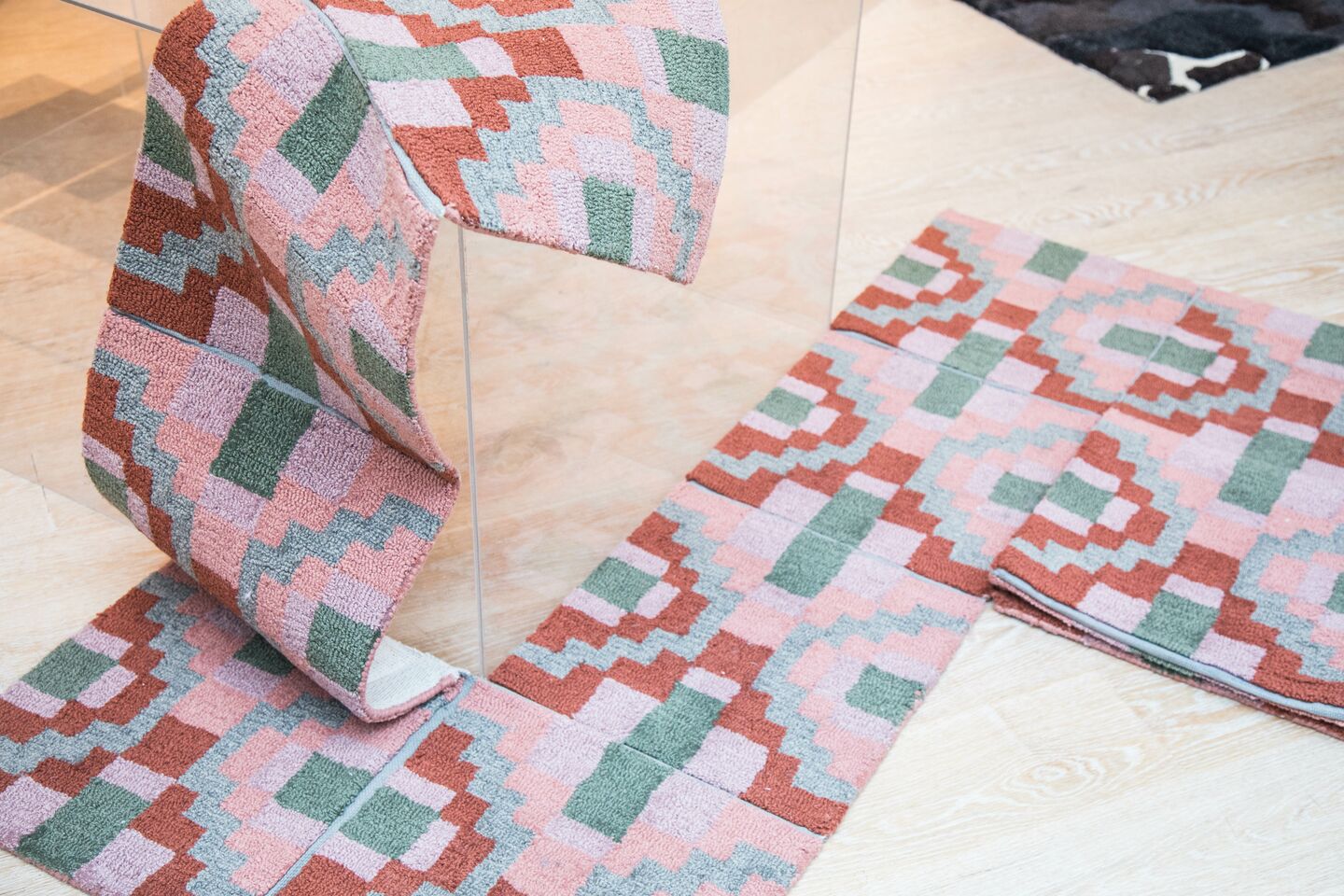the new school's Parsons School of Design announces new partnership obeetee, the world's leading handwoven rug companyObeetee partnered with students from the MFA Textiles program at Parsons to research, reimagine, and conceptualize what rugs can be in the 21st century |
NEW YORK, NY, September 6, 2019 — The New School’s Parsons School of Design is proud to announce a new partnership with India-based handwoven rug brand OBEETEE. The partnership is the first of its kind for both Parsons and OBEETEE, and has been integrated into Year 1 of the school’s newly launched MFA Textiles program in a formal curricular course called Textiles Industry Partnership. The collaboration affords students the opportunity to work with the OBEETEE team to explore new markets, develop colors and patterns, introduce sustainability techniques to the brand, and create and innovate new design concepts. As the world’s leading manufacturer and supplier of handwoven rugs, and the first company in the market to be recognized with the Social Accountability System Certificate by DNV and the Social Accountability International of New York in 2004, OBEETEE provides students of the Textiles MFA program with the opportunity to understand the rug industry’s market and supply chain, as well as develop skills and product at the highest, most reputable and traceable levels. The MFA Textiles program will primarily serve as an innovation hub for OBEETEE, as students will research, reimagine and conceptualize what rugs can be in the 21st century. The students’ research and innovation highlight The New School’s values of social justice and sustainability, while considering the potential integration of technology in handcrafted rugs. Throughout the sponsored course, which began in Spring 2019 and culminates with a public presentation of design innovations during the Fall 2019 semester, students focused their research and product development on the needs of boutique hotels and how brands can break into that market; researching new concepts, yarns, and colors; and aimed to define parameters for rug designs specific to the hospitality industry. Parsons students also visited the brand’s showroom in NYC where they engaged with OBEETEE leadership, designers, and experts. During the summer, 4 students visited OBEETEE’s factory in Mirzapur, India, for a month-long immersive experience. These students conducted interviews and research, developed prototypes, learned about manufacturing processes, supply chain, design methodologies and discovered the underlying philosophy and values of the company. The students then shared their findings and rug experiments with the rest of their classmates back in NYC, and together the class developed a vision for OBEETEE that includes design concepts, materials, and systems innovation under the expert guidance of their faculty in the MFA Textiles studio at Parsons. “We’re so pleased to be partnering with The New School’s Parsons School of Design on this groundbreaking program,” said Rudra Chatterjee, chairman of OBEETEE. “For both our companies, our commitment to thoughtfully crafted and sustainable design practices has made each of us the leaders in our markets. We’re excited to be collaborating this way and be sharing our unique expertise and heritage with the next generation of global design leaders.” "Parsons is proud to collaborate with OBEETEE on this "real-world" project that enabled our students to research, understand, innovate, and propose new design concepts and systems to the world's leader in hand-woven carpets,” said Burak Cukmak, Dean Fashion at Parsons. “We are grateful to OBEETEE for the opportunity this provided our students to gain professional experience and valuable insights about the rug industry as it is today." The final element of the program will include an exhibition to showcase the collaboration in OBEETEE’s New York showroom during the September 2019 design Market Week and New York Textile Month. The students will share their design concepts, prototypes, and fruits of the project with industry leaders, editors, buyers, interior designers, and decorators. The MFA Textiles program at Parsons is centered around the intersectionality of craft, technology, beauty and sustainability. The talented students are guided by exceptional faculty to engage with heritage and contemporary hand crafting of textiles, seeking to dissolve the boundaries between craft and technology in order to create a new paradigm for textiles in the 21st century. |
|
Parsons School of Design is one of the leading institutions for art and design education in the world. Based in New York but active around the world, the school offers undergraduate and graduate programs in the full spectrum of art and design disciplines. Critical thinking and collaboration are at the heart of a Parsons education. Parsons graduates are leaders in their respective fields, with a shared commitment to creatively and critically addressing the complexities of life in the 21st century. For more information, please visit www.newschool.edu/parsons. OBEETEE is the global leader in handwoven rugs. A dynamic, creative and ethical company, OBEETEE is driven by design excellence, quality craftsmanship and process innovation throughout its almost 100 year history. Today, OBEETEE has one of the largest and most modern rug manufacturing facilities in the world, including the industry’s first water effluent treatment plant. However, we place an equal focus on the integrity of our craftsman heritage. Our 25,000+ independent weavers create extraordinary woven carpets, using traditional artisanal skills that have been handed down through generations. Our craftspeople are the cornerstone of our business, and therefore, we place great focus and responsibility on our contribution not only to our weavers, but also to their families and the communities in which they live. OBEETEE was the first company in the handmade woolen carpet industry to be awarded the Social Accountability System Certificate (SA 8000) by DNV, which is one of the most reputable auditing/certification bodies accredited by Social Accountability International of New York, in 2004. |
 |
MARKETING AND COMMUNICATION |
| 79 Fifth Avenue New York, NY 10003 www.newschool.edu |
PRESS RELEASE |
Media Contacts: Will Wilbur, Follow @TheNewSchool |
|
|
